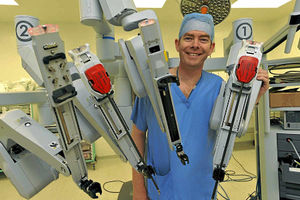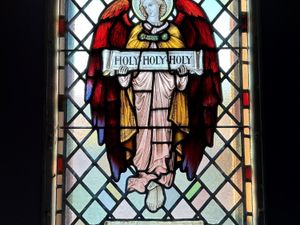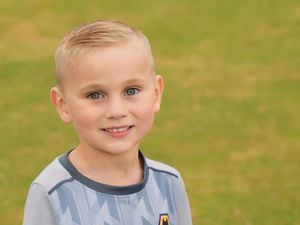New Cross Hospital leads the way with pioneering robotic heart surgery
Pioneering robotic heart surgery which reduces recovery time from months to weeks has been performed for the first time in the UK at Wolverhampton's New Cross Hospital.

Surgeons carried out the open heart operation – which involves directing four robot arms from a separate console – in the hospital's renowned Heart and Lung Centre.
The procedure is more common in America, where the Da Vinci robotic technology was developed, but only currently available at two other hospitals in Europe, in Finland and Sweden.
A tiny camera on the end of an arm – which can rotate up to 540 degrees – gives surgeons unrivalled views of the heart, while surgical metal 'fingers' do the crucial work required.
The sharp reduction in recovery time comes from only small incisions being made to enable the arms to gain access, as opposed to making cuts through the breastbone as is done in normal heart surgery which take longer to heal.
Surgeons Moninder Bhabra and Stephen Billing jointly carried out the two procedures last week – swapping over from console and bedside halfway through to share the load – and hope to do around 30 per year.
Mr Billing said they were pleased and lucky to have the opportunity to use the Da Vinci system and to be able to offer it to our patients, who were given the option as to have robotic or regular surgery.
"You can't put a price on how quickly the patient feels back to normal," he added.
"With this reduced access procedure the pain settles very quickly.
"Patients should be discharged slightly earlier and the main advantage is returning to normal activities far more quickly.
"Operations take longer at present but many steps of the procedure are novel to us
"It should be pointed out that the machine is an instrument and doesn't have any autonomy – all movements are directly and precisely controlled."
Robotic surgery is performed at some hospitals in the UK but until now not for open heart surgery, where surgeons actually go inside the heart.
Other benefits of Da Vinci include reduced bleeding, fewer painkillers needed and patients having a marginally shorter stay in hospital.
Mr Bhabra said: "The goal in surgery is always to make it less invasive but as soon as you make an incision smaller you don't get as a good a view of what you're doing and the range of instruments you can used is reduced.
"The robotic system takes away those problems.
"The camera gives us a fantastic, magnified, 3D, high definition view of the heart which we wouldn't get any other way."
Around 12 open heart procedures will be done with Da Vinci – which was acquired by the Royal Wolverhampton NHS trust 18 months ago – before next April and all patients have been carefully talked through the process.
Mr Bhabra paid tribute to his hand-picked team of anaesthetists, nurses and assistants.
"It really is a big team effort," he added.
"It's a learning curve for all of us but you slow right down because you want to be safe
"We were repeatedly asked by hospital management what the benefit was to the hospital and we said we're not thinking about the hospital, we're thinking about the patient."
Mother-of-one Natalie Jones, aged 22 and who was born with a hole in the heart, was the first patient in the UK to have robotic open heart surgery.
The Stourbridge resident said: "It wasn't an easy decision because it hadn't been done in the UK but I wanted to recover more quickly for my little son Dylan.
"The option was given to me and I was really nervous about it but I just needed to see Dylan as soon as possible. There isn't as much scarring either.
"To think that I'm up and about already is amazing."
Health experts from Finland travelled to the UK to oversee the first procedures, which have both been hailed as a success.
Paul Whitehouse, aged 43, and from Halesowen, underwent a repair of a leaking heart valve.
He said: "It's surprised me how quickly I've recovered already. It's been a complete success.
"Originally my recovery time was going to be six months but I've been told it could be six to eight weeks this way.
"I was a bit anxious beforehand but the fact there were three surgeons there as well was a bit of a fail-safe.
"Anyone that can have surgery this way, I would recommend them to do it."




